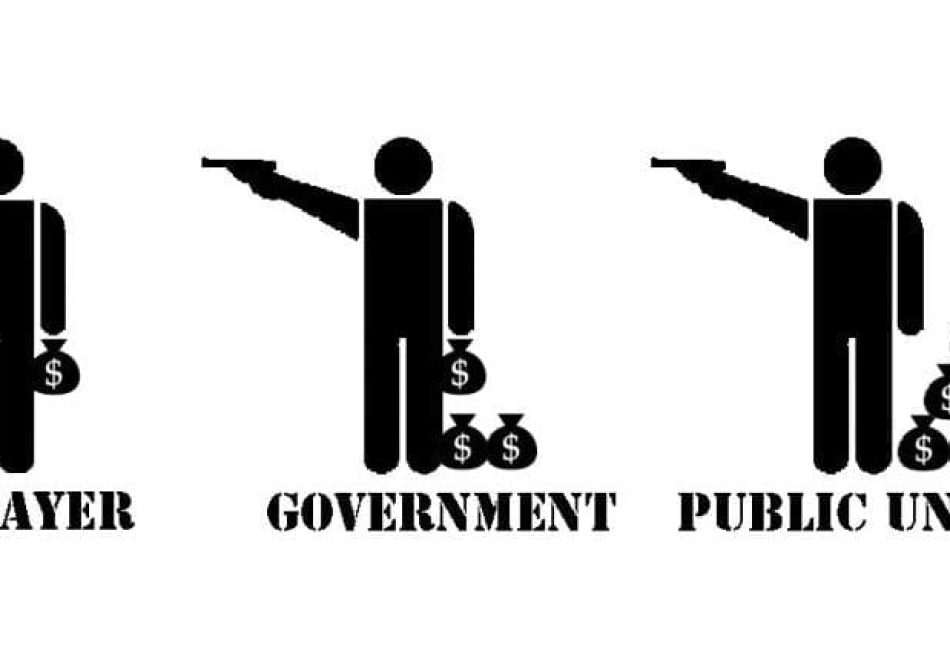Other Tax and Budget Public Unions’ Days Numbered

The New Mexico Public Employees Retirement Association is considering reducing future retirement benefits for more than 54,000 government workers, mostly because of growing concerns about the solvency of the fund.
It’s about time. The main reason why so many state and local governments are bankrupt, or on the verge of bankruptcy, is the combination of government-run monopolies and government-employee unions.
Government-employee unions have vastly more power than do private-sector unions because the entities they work for are typically monopolies. As reported, the unfunded liability of the PERA fund has more than doubled in the past two years, from $2.3 billion in mid-2009 to $4.9 billion as of mid-2011. The unfunded liability is the difference between future retirement benefits due and assets on hand.
Carter Bundy, the political director for the American Federation of State, County and Municipal Employees union, is on record as saying, “the union believes the base retirement formula used to determine a worker’s pension should not be altered.” To that I say, the economics of the world have been altered, if Bundy hasn’t noticed.
There is a huge difference between private- and public-sector union employees. For example, when the employees of a grocery story go on strike and shut down the store, consumers can simply shop elsewhere and grocery-store management is perfectly free to hire replacement workers.
In contrast, when a city goes on strike, there is no school and no garbage collection as long as the strike goes on. Teacher tenure and civil service regulations make it extremely costly if not virtually impossible to hire replacement workers. The enormous power of government-employee unions effectively transfers the power to tax from voters to the unions. Because government-employee unions can so easily force elected officials to raise taxes to meet their “demands,” it is they, not the voters, who control the rate of taxation within a political jurisdiction.
Politicians are caught in a political bind by government-employee unions: If they cave in to their wage demands and raise taxes to finance them, then they increase the chances of being kicked out of office themselves in the next election. The “solution” to this dilemma has been to offer government-employee unions moderate wage increases but spectacular pension promises. This allows politicians to pander to the unions but defer the costs to the future.
As taxpayers in New Mexico are realizing, the future has arrived. The PERA fund has $16.8 billion in future obligations and $11.9 billion on hand as of the most recent calculation. New Mexico must either raise taxes dramatically to fund these liabilities, or drastically cut back or eliminate government-employee pensions.
Government-employee unions are also champions of “featherbedding” – the union practice of forcing employers to hire more than the number of people necessary to do the job. If this occurs in the private sector, the higher wage costs will make the firm less competitive and less profitable.
No such thing happens in government, where there are not profit-and-loss statements in an accounting sense, and most agencies are monopolies anyway.
In 2012, as we have witnessed Scott Walker not being recalled as governor in Wisconsin because of his tough stance on public-employee unions, this pension charade appears to be on its way to being over.
American taxpayers finally seem to be aware that they are the servants, not the masters, of government at all levels. Government-employee unions have played a key role in causing bankruptcy in most American states. We, in New Mexico, are at a crucial decision-point to decide not to travel that road to financial ruination and say “no more” to the pension demands of destructive public-employee unions.
Tom Molitor is adjunct scholar with New Mexico’s Rio Grande Foundation. The Rio Grande Foundation is an independent, non-partisan, tax-exempt research and educational organization dedicated to promoting prosperity for New Mexico based on principles of limited government, economic freedom and individual responsibility.

